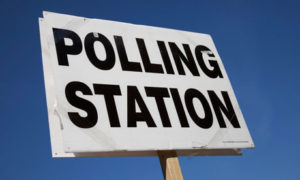I listened today to a candidate for the Amarillo City Council tell his audience about the things he has learned about running for public office.
Eddy Sauer is seeking to be elected in Place 3 to succeed incumbent Councilman Randy Burkett, who isn’t seeking re-election.
Sauer gave some fairly standard remarks to the Rotary Club of Amarillo about how a lifelong Amarillo resident can have his eyes opened about the complexities of governing a city of roughly 200,000 residents. He spoke mostly about economic development, speaking intelligently about how the city should continue to seek companies willing to locate here; offer them financial incentives and then seek to ensure that they provide sufficient numbers of new jobs to make the investment worthwhile.
He also spoke of improving “transparency” on the Amarillo Economic Development Corporation.
Yes, the man is learning about the city, about its challenges. Sauer is an impressive fellow who I hope gets elected on May 6.
***
Sauer and I visited for a few minutes before he stood behind the podium. I mentioned to him how elections have been educational to me during more than 22 years living in Amarillo and, for most of that time, commenting on them as a full-time opinion journalist at the Amarillo Globe-News.
Indeed, these municipal elections have managed during every election cycle dating back to my first year here — 1995 — to tell me something about the community I didn’t know previously.
I suspect that is perhaps the most gratifying aspect of these elections. Twenty-two years after settling in at my new post at the G-N, I’m still learning about this community.
Before you ask what precisely have I learned, I must tell you that I cannot define it in tangible terms. Early on I learned about the landmark 1989 city election that resulted in a dramatic turnover of the five-member City Commission; the local economy was in deep trouble, the city had been feuding with leading business leaders; folks were angry.
By the time I arrived at my post, much of that anger had subsided. The city, though, had plenty to teach this newcomer to the Texas Panhandle.
I’ve been learning a little more every odd-numbered year when the City Council’s five members are selected by city voters.
Think, too, about this: Given that Texas elects its Legislature every even-numbered year — as do the state’s 254 counties — we residents get a chance to be “educated” every single year.
I told Sauer that even my perch in the peanut gallery — given that I no longer “work for a living” — provides me with an election-year opportunity to learn something new about Amarillo.
This, I suppose, is my way of revealing my biggest takeaway from these local elections. It happened in Beaumont, when my wife and sons and I first moved to Texas back in 1984. I can go back even to my first full-time journalism job in Oregon City, Ore., which bears little resemblance to my familiar surroundings in big-city Portland.
The upcoming election is likely to teach me more, still, about Amarillo. Indeed, elections can provide teachable moments if we all keep an open mind.
The good news is that the learning curve isn’t nearly so steep these days. Still, it never will level out. Nor should it.

